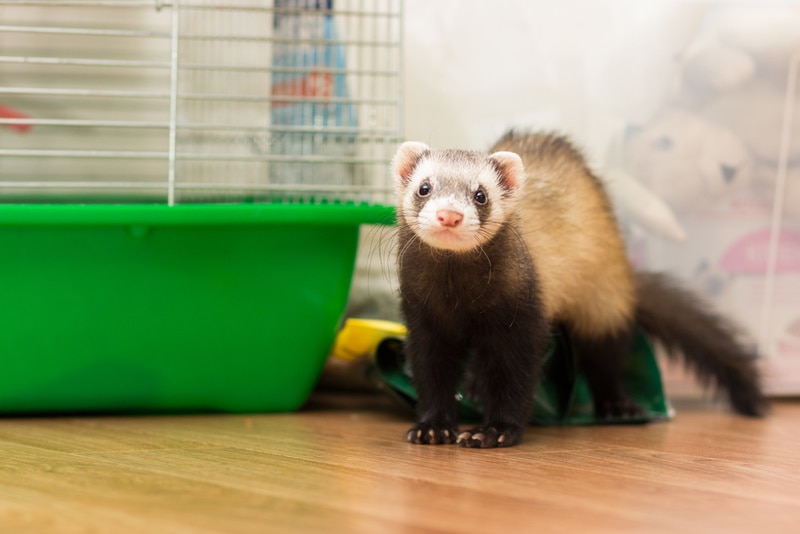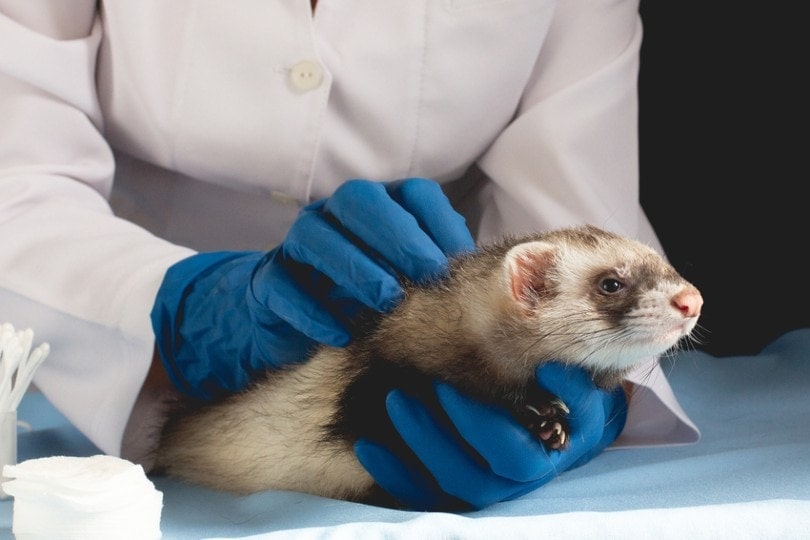
Every thing poops, so you probably have a pet, understanding the ins and outs of their poop is a vital a part of accountable possession. Realizing how typically your pet poops and what’s regular is step one towards monitoring their well being.
How typically do ferrets poop? As animals with quick metabolisms, grownup ferrets poop each three or 4 hours, however rather more typically after they’re younger. However there’s much more to learn about regular ferret poop habits and choosing up on early indicators of an issue.
The Ferret Digestive Tract
The gastrointestinal tract has totally different segments that play a task in processing meals, absorbing vitamins, and excreting waste. If something goes incorrect in any phase, it might probably have an effect on what comes out.
Meals goes into the mouth and is quickly damaged down by the enamel and saliva. The enamel maintain, seize, and tear, whereas the saliva acts as a lubricant and softener for meals. It additionally accommodates digestive enzymes to start the digestive course of.
From there, meals enters the esophagus—an extended tube that connects the mouth to the abdomen. Ferrets have a easy abdomen that secretes acid and pepsin in response to the arrival of meals, which is then damaged down by the gastric acid.

The meals then passes to the small gut, which does many of the work. Meals is digested, and vitamins are absorbed within the small gut, which has a lining with billions of folds (villi) that maximize contact with meals.
The meals continues to the big gut, which has a easy perform: extracting water from the remaining meals and storing feces earlier than it’s excreted. Some nutritional vitamins and minerals are absorbed by the big gut as nicely. The massive gut has mucus-producing cells that blend with the contents to facilitate excretion.
Lastly, the contents of the gut attain the rectum—the distal a part of the big gut—and are saved instantly earlier than excretion by way of the anus. Now we all know what goes on inside, let’s check out what occurs subsequent.
Diagnosing Drawback Poop

Wholesome ferret poop ought to be agency; not too exhausting, not too unfastened. A comfortable, easy tube form which is mild tan to brown in colour. That is solely when it’s recent, nonetheless. As soon as uncovered to air, ferret poop will desiccate, shrink, harden, and switch darkish brown.
Your ferret ought to poop each three or 4 hours, but it surely’s not essentially a trigger for alarm if yours goes just a little extra or rather less steadily. What’s vital is studying what’s regular for them.
You also needs to take note of the general high quality of your ferret’s poop over a time period. One dangerous poop isn’t essentially an indicator that one thing is incorrect. Additionally, some ailments don’t trigger unhealthy stool, so good poop doesn’t at all times imply your ferret is healthy. This is only one indicator of many to find out your ferret’s well being.
When your ferret’s poop isn’t regular, some clues can level to the potential trigger and space of the digestive system:
- In case your ferret has small or no poop mixed with weight reduction, it might point out an issue with their meals consumption.
- In case your ferret has gastric illness, when the abdomen can’t break down meals, bigger particles with intact proteins move into the small gut. This attracts water and may trigger bulkier, unfastened
- Gastric ulcers typically bleed, mixing blood with the contents of the abdomen. As soon as digested, the blood turns black. This will trigger unfastened black stools from poor digestion, although there’s not at all times sufficient blood to be seen within the stool.
- Any illness that impacts the villi within the small gut impacts your ferret’s capacity to soak up meals, which causes extreme greenish, fluid diarrhea. Word that inexperienced stools will be seen with different ailments, nonetheless.
- With ailments like inflammatory bowel illness, which causes the physique to assault its personal villi, the undigested, unabsorbed fat and proteins move into the big gut as balls of fats and protein. This offers the stool a birdseed-like look.
- The massive gut extracts water, so a illness that impacts it might probably result in watery stool. It’s additionally lined with mucus-producing cells, which can trigger the feces to have seen mucus or a mucus coating.
- Not like ulcers, a hemorrhage within the massive gut passes blood into the feces unchanged, resulting in brilliant pink blood within the stool. That is distinctly totally different from black feces attributable to digested blood.
- Although points with the anus don’t mirror within the stool, chances are you’ll discover ache or straining when your ferret tries to poop.
There are different indicators that don’t level to a particular a part of the digestive system, nonetheless:
If meals is passing by way of the digestive system too shortly, it’s not utterly digested and could also be inexperienced and birdseed-like.
If poop is grey as a substitute of brown, it might point out anemia or an obstruction of the bile ducts.
If poop is solely bloody, that’s typically a sign of an enormous hemorrhage within the digestive tract.
Pencil-thin stool might point out a partial blockage from a overseas physique, which permits some feces to move however not all.
Whole absence of stool in a ferret that’s consuming could be a signal of a complete blockage. That is typically mixed with different indicators of ache like enamel grinding and a hunched posture.
In case you have any considerations about your ferret’s poop, be sure to contact your vet.
Conclusion
Poop is a vital indicator of total well being. When you can’t diagnose all the things based mostly on poop—or take into account an animal wholesome simply based mostly on poop—it may give you an early warning about some diseases. Make monitoring your ferret’s poop a part of your routine to know what’s regular on your ferret. In case you are nervous that issues should not regular, at all times ask your vet.
Featured Picture Credit score: Fayzulin Serg, Shutterstock


